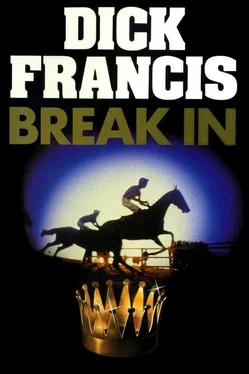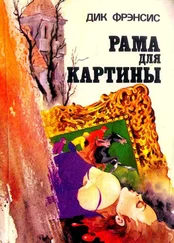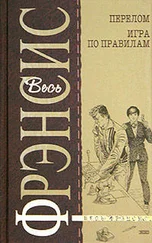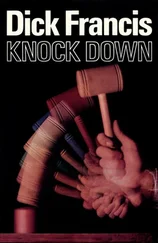With love and thanks
to my son
MERRICK
racehorse trainer
and to
NANCY BROOKS GILBERT
bureau coordinator for WSVN
Blood ties can mean trouble, chains and fatal obligation. The tie of twins, inescapably strongest. My twin, my bond.
My sister Holly, sprung into the world ten minutes after myself on Christmas morning with bells ringing over frosty fields and hope still wrapped in beckoning parcels, my sister Holly had through thirty years been cot-mate, puppy-companion, boxing target and best friend. Consecutively, on the whole.
My sister Holly came to Cheltenham races and intercepted me between weighing room and parade ring when I went out to ride in a three-mile steeplechase.
‘Kit!’ she said intensely, singling me out from among the group of other jockeys with whom I walked, and standing four-square and portentously in my way.
I stopped. The other jockeys walked on, parting like water round a rock. I looked at the lines of severe strain in her normally serene face and jumped in before she could say why she’d come.
‘Have you any money with you?’ I said.
‘What? What for?’ She wasn’t concentrating on my question but on some inner scenario of obvious doom.
‘Have you?’ I insisted.
‘Well... but that’s not...’
‘Go to the Tote,’ I said. ‘Put all you’ve got on my horse to win. Number eight. Go and do it.’
‘But I don’t...’
‘Go and do it,’ I interrupted. ‘Then go to the bar and with what’s left buy yourself a triple gin. Then come and meet me in the winners’ enclosure.’
‘No, that’s not...’
I said emphatically, ‘Don’t put your disaster between me and that winning post.’
She blinked as if awakening, taking in my helmet and the colours I wore beneath my husky, looking towards the departing backs of the other jockeys and understanding what I meant.
‘Right?’ I said.
‘Right.’ She swallowed. ‘All right.’
‘Afterwards,’ I said.
She nodded. The doom, the disaster, dragged at her eyes.
‘I’ll sort it out,’ I promised. ‘After.’
She nodded dumbly and turned away, beginning almost automatically to open her shoulder bag to look for money. Doing what her brother told her, even after all these years. Coming to her brother, still, for her worst troubles to be fixed. Even though she was four years married, those patterns of behaviour, established in a parentless childhood, still seemed normal to us both.
I’d sometimes wondered what difference it would have made to her if she had been the elder by that crucial ten minutes. Would she have been motherly? Bossy, perhaps. She felt safer, she’d said, being the younger.
I walked on towards the parade ring, putting consciously out of my mind the realisation that whatever the trouble this time, it was bad. She had come, for a start, one hundred and fifty miles from Newmarket to see me, and she disliked driving.
I shook my head physically, throwing her out. The horse ahead, the taxing job in hand, had absolute and necessary priority. I was primarily no one’s brother. I was primarily Kit Fielding, steeplechase jockey, some years champion, some years not, sharing the annual honour with another much like myself, coming out top when my bones didn’t break, bowing to fate when they did.
I wore the colours of a middle-aged princess of a dispossessed European monarchy, a woman of powerful femininity whose skin was weathering towards sunset like cracked glaze on porcelain. Sable coat, as usual, swinging from narrow shoulders. Glossy dark hair piled high. Plain gold earrings. I walked towards her across the parade-ring grass; smiled, bowed, and briefly shook the offered glove.
‘Cold day,’ she said; her consonants faintly thick, vowel sounds pure English, intonation as always pleasant.
I agreed.
‘And will you win?’ she asked.
‘With luck.’
Her smile was mostly in the eyes. ‘I will expect it.’
We watched her horse stalk round the ring, its liver chestnut head held low, the navy rug with gold embroidered crest covering all else from withers to tail. North Face, she’d named it, from her liking for mountains, and a suitably bleak, hard and difficult customer he’d turned out to be. Herring-gutted, ugly, bad-tempered, moody. I’d ridden him in his three-year-old hurdles, his first races, and on over hurdles at four, five and six. I’d ridden him in his novice steeplechases at seven and through his prime at eight and nine. He tolerated me when he felt like it and I knew his every mean move. At ten he was still an unpredictable rogue, and as clever a jumper as a cat. He had won thirty-eight races over the years and I’d ridden him in all but one. Twice to my fury he had purposefully dropped his shoulder and dislodged me in the parade ring. Three times we had fallen together on landing, he each time getting unhurt to his feet and departing at speed with indestructible legs, indestructible courage, indestructible will to win. I loved him and hated him and he was as usual starting favourite.
The princess and I had stood together in such a way in parade rings more often than one could count, as she rarely kept fewer than twenty horses in training and I’d ridden them constantly for ten years. She and I had come to the point of almost monosyllabic but perfectly understood conversation and, as far as I could tell, mutual trust and regard. She called me ‘Kit’, and I called her ‘Princess’ (at her request) and we shared a positive and quite close friendship which nevertheless began and ended at the racecourse gates. If we met outside, as occasionally happened, she was considerably more formal.
We stood alone together in the parade ring, as so often, because Wykeham Harlow, who trained North Face, suffered from migraine. The headaches, I’d noticed, occurred most regularly on the coldest days, which might have been a truly physical phenomenon, but also they seemed to develop in severity in direct ratio to the distance between his armchair and the day’s racing. Wykeham Harlow trained south of London and very seldom now made the north-westerly traverse to Cheltenham: he was growing old and wouldn’t confess he was nervous about driving home in the winter dark.
The signal was given for jockeys to mount, and Dusty, the travelling head-lad who nowadays deputised for Wykeham more often than not, removed North Face’s rug with a flick and gave me a deft leg-up into the saddle.
The princess said, ‘Good luck’, and I said cheerfully, ‘Thank you.’
No one in jump racing said ‘Break a leg’ instead of ‘Good luck’, as they did in the theatre. Break a leg was all too depressingly possible.
North Face was feeling murderous: I sensed it the moment I sat on his back and put my feet in the irons. The telepathy between that horse and myself was particularly strong always, and I simply cursed him in my mind and silently told him to shut up and concentrate on winning, and we went out on to the windy track with the mental dialogue continuing unabated.
One had to trust that the urge to race would overcome his grouchiness once the actual contest started. It almost always did, but there had been days in the past when he’d refused to turn on the enthusiasm until too late. Days, like this one, when his unfocussed hatred flowed most strongly.
There was no way of cajoling him with sweet words, encouraging pats, pulling his ears. None of that pleased him. A battle of wills was what he sought, and that, from me, was what he habitually got.
We circled at the starting point, seven runners in all, while the roll was called and girths were tightened. Waited, with jockeys’ faces turning pale blue in the chilly November wind, for the seconds to tick away to start-time, lining up in no particular order as there were no draws or stalls in jump races, watching for the starter to raise the tapes and let us go.
Читать дальше




